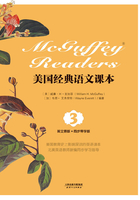
LESSON 10
THE YOUNG TEACHER
WORD LIST
sign marks parcels venture inquire
chalk ruling drawing pictures confused
1. Charles Rose lived in the country with his father, who taught him to read and to write.
2. Mr. Rose told his son that, when his morning lessons were over, he might amuse himself for one hour as he pleased.
3. There was a river near by. On its bank stood the hut of a poor fisherman, who lived by selling fish.
4. His careful wife kept her wheel going early and late. They both worked very hard to keep themselves above want.
5. But they were greatly troubled lest their only son should never learn to read and to write. They could not teach him themselves, and they were too poor to send him to school.
6. Charles called at the hut of this fisherman one day, to inquire about his dog, which was missing.

7. He found the little boy, whose name was Joe, sitting by the table, on which he was making marks with a piece of chalk. Charles asked him whether he was drawing pictures.
8. “No, I am trying to write, ” said little Joe, “but I know only two words. Those I saw upon a sign, and I am trying to write them.”
9. “If I could only learn to read and write, ” said he, “I should be the happiest boy in the world.”
10. “Then I will make you happy, ” said Charles, “I am only a little boy, but I can teach you that.”
11. “My father gives me an hour every day for myself. Now, if you will try to learn, you shall soon know how to read and to write.”
12. Both Joe and his mother were ready to fall on their knees to thank Charles. They told him it was what they wished above all things.
13. So, on the next day when the hour came, Charles put his book in his pocket, and went to teach Joe. Joe learned very fast, and Charles soon began to teach him how to write.
14. Some time after, a gentleman called on Mr. Rose, and asked him if he knew where Charles was. Mr. Rose said that he was taking a walk, he supposed.
15. “I am afraid, ” said the gentleman, “that he does not always amuse himself thus. I often see him go to the house of the fisherman. I fear he goes out in their boat.”
16. Mr. Rose was much troubled. He had told Charles that he must never venture on the river, and he thought he could trust him.
17. The moment the gentleman left, Mr. Rose went in search of his son. He went to the river, and walked up and down, in hope of seeing the boat.
18. Not seeing it, he grew uneasy. He thought Charles must have gone a long way off. Unwilling to leave without learning something of him, he went to the hut.
19. He put his head in at the window, which was open. There a pleasant sight met his eyes.
20. Charles was at the table, ruling a copybook Joe was reading to him, while his mother was spinning in the corner.
21. Charles was a little confused. He feared his father might not be pleased; but he had no need to be uneasy, for his father was delighted.
22. The next day, his father took him to town, and gave him books for himself and Joe, with writing paper, pens, and ink.
23. Charles was the happiest boy in the world when he came home. He ran to Joe, his hands filled with parcels, and his heart beating with joy.
STUDY GUIDE
A. Scrambled Sentences—Put the following sentences in the correct order. The first one has been done for you.
1. Charles Rose's father taught him how to read. ( 1 )
2. Mr. Rose took Charles to town to buy books, paper, pens, and ink for teaching Joe. ( )
3. Charles told Joe he could teach him to read and write. ( )
4. Mr. Rose told his son that when his lesson was over, he had free time. ( )
5. Charles went to the fisherman's hut one day. ( )
6. Mr. Rose searched for his son. ( )
7. Charles was the happiest boy in the world. ( )
8. Joe told Charles he couldn't read or write. ( )
9. The fisherman and his wife were worried that their son wouldn't learn to read. ( )
10. A gentleman told Mr. Rose that Charles was not out for a walk. ( )
11. A poor fisherman lived on a river nearby. ( )
12. Mr. Rose found Charles in the hut teaching Joe. ( )
B. Discussion Questions—Talk about these questions.
1. Why were Joe's parents happy that Charles taught their son to read?
2. Why was Mr. Rose worried about Charles?
3. What was Charles doing when his father found him? Why was his father happy about this?
4. Do you think it was a good idea for Charles to spend his free time teaching Joe to read? Why or why not?
5. Has somebody taught you something important? What did he or she teach you?
6. Would you like to teach someone to read? Why or why not?
C. Matching—Match the vocabulary word in A with the meaning in B.
A
sign
chalk
marks
ruling
parcels
drawing
venture
pictures
inquire
confused
B
making a straight line
goods wrapped in a package
to ask a question
go somewhere dangerous
produce a picture with lines
a public board with information
written or printed symbols
images made with pens or pencils
a soft substance used for drawing
not understanding/ unclear